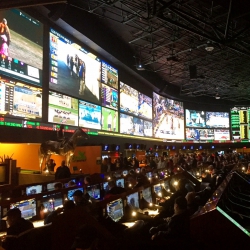
March Madness is expected to generate $10 billion in sports bets and $2.8 billion in office pool bracket bets.
The 2018 NCAA Men’s Basketball Tournament is here and it’s time for people to fill out their March Madness brackets. The one-and-done tournament takes place over three weeks in March and early April ever year.
Bracketology is bigger than ever, with 54 million Americans participating in a sports betting pool. Roughly 25% of the adult US population bets on March Madness, filling out brackets and putting in $2.6 billion in entry fees.
Gambling on the NCAA basketball tournament is bigger than ever, too. The American Gaming Association (AGA) estimates about $10 billion will be wagered on March Madness this year, though abuot 97% of that might be done illegally.
Geoff Freeman on NCAA Bracketology
Geoff Freeman, president and CEO of the AGA, used the occasion to once again call for legal sports betting in the United States. Freeman noted that only 3% of the sports betting activity would go through Las Vegas sportsbooks, where gambling on the NCAA is legal.
Freeman pointed out the waste and corruption the PASPA law creates, by pointing out the fact NCAA brackets are technically illegal. He said, “Our current sports betting laws are so out of touch with reality that we’re turning tens of millions of Americans into criminals for the simple act of enjoying college basketball. The failed federal ban on sports betting has created an illegal, unregulated sports betting market that offers zero consumer protections and generates zero revenue for state and tribal governments.”
18 States Considering Legal Sportsbooks
The head of the American Gaming Association, which represents a who’s who of land-based and online US gambling companies, said almost 40% of US states are preparing for legal sportsbooks. The US Supreme Court soon will rule on the constitutionality of a 25-year old federal sports betting law.
If the PAPSA ban is overturned, then as many as 18 new states might legalize sports betting in their borders in 2018. Freeman noted that 18 US states currently have a total of 48 different pro-sports betting bills being discussed in legislatures. Most bills would allow land-based casinos and racetracks to operate sportsbooks.
In-Play Sports Betting
Geoff Freeman said that “a flood of new products” would appear, if a sports betting were legalized in the United States. When asked to elaborate, Freeman noted the “live betting” or “in-play betting” which has become more popular in other countries. Live/in-play betting allows bettors to wager on in-game events, such as who the next scorer will be, instead of simply the outcome of the game or the over/under total.
Virtual Sports and eSports Betting
A variety of other products would be possible. Electronic sports betting or eSports betting would be available in most brick-and-mortar sportsbooks. Esports is organized video game or online game playing for prizes. World class eSports competitors receive significant prizes for winning events, which draw big crowds both in live venues and on Twitch live streams.
Virtual sports are another popular game. Virtual sports do not use live sporting events, but instead run video simulations similar to Madden Football 2018, NBA 2018, or FIFA 2018. Anywhere sports betting is legal, opportunities like eSports and virtual sports betting likely would be legal, too. Online and mobile sports betting still would be banned, because of the 2006 UIGEA act and the 1961 Wire Act.
Opposition to Sports Betting
Not everyone is thrilled with the prospect of legal sports betting. The Council on Compulsive Gambling of New Jersey says that “sports betting is a cause for concern.” Neva Pryor, the executive director of the NJ Council on Compulsive Gambling, said gambling on sports is a bigger threat than poker or casino gambling, because it involves sports icons.
Pryor said, “Sports betting may have more appeal to our children, it has the potential to affect the integrity of the games, and it may put many more people at risk for problem and disordered gambling.”
